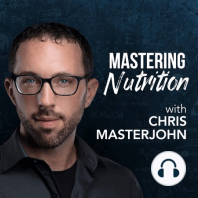72 min listen

How much spinach, broccoli, and kale is too much? | Masterjohn Q&A Files #66
How much spinach, broccoli, and kale is too much? | Masterjohn Q&A Files #66
ratings:
Length:
3 minutes
Released:
Feb 19, 2020
Format:
Podcast episode
Description
Question: How much spinach, broccoli, and kale is too much? Cruciferous vegetables have an issue with potential goitrogens. At serving sizes like this, the only issue with cruciferous vegetables is that they increase your iodine requirement. In theory, if you are juicing cruciferous vegetables to have like ten servings a day, in theory, you might get to the point where you cannot overcome the goitrogenic effect with iodine. That is based entirely on animal experiments that were done a long time ago, and we have no human data on where you cross that threshold. But in this case, I think two or three servings of cruciferous vegetables basically just means you need to pay a little bit more attention to your iodine status. In particular, you want to make sure that you're eating some seafood. If you're eating some seaweed in your diet, you're getting plenty of iodine in most cases. If you're not sure if you're getting enough iodine, then I would say 200 to 400 micrograms of iodine from a kelp powder-based supplement would be fine. Also, as a seasoning, you can get Maine Coast Sea Seasonings where you can just sprinkle seaweed onto your dishes as a flavor. It's like a salt shaker so it's really easy to use. Using that if you don't mind the taste is a great way to get iodine. I think that's really only the main concern there. The spinach is not a cruciferous vegetable, so it's not really contributing to this problem. It is high in oxalates and so it has its own problem. As long as you're getting calcium with the oxalate, for most people, there are exceptions to this. But if you don't personally have an oxalate issue, meaning a high risk of kidney stones driven by high oxalate levels in your urine or potentially behavioral issues in children some people are tying to oxalates. But if you don't have a specific issue with that, then I think really the only issue with oxalate is you want to make sure that you're consuming calcium in the meal that you're getting it in. The spinach has calcium, but it's only about 5% bioavailable so you should basically discount the calcium in the spinach. The kale and broccoli have bioavailable calcium. If you're mixing them together, that's probably a great way to do that, but you might not be hitting 300 milligrams of calcium in a meal. I think if you have a lot of oxalate in a meal, you probably really want to make sure you hit 300 milligrams of calcium in that meal. This Q&A can also be found as part of a much longer episode, here: https://chrismasterjohnphd.com/podcast/2019/03/30/ask-anything-nutrition-march-4-2019 If you would like to be part of the next live Ask Me Anything About Nutrition, sign up for the CMJ Masterpass, which includes access to these live Zoom sessions, premium features on all my content, and hundreds of dollars of exclusive discounts. You can sign up with a 10% lifetime discount here: https://chrismasterjohnphd.com/q&a
Released:
Feb 19, 2020
Format:
Podcast episode
Titles in the series (100)
010: How to Know if Your Genetics Contribute to Blue Light Sensitivity and Poor Sleep — and What to Do About It: In this episode, I show you how you can determine whether your genetics are contributing to your sensitivity to blue light, poor sleep, and poor daytime alertness, and what you can do about it. Specifically, I look at the research showing that... by Mastering Nutrition